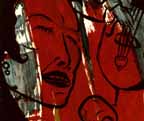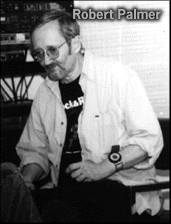
|
|
 [
AJHF |
About |
Home |
News |
Dates |
Artists |
Archive
]
[
AJHF |
About |
Home |
News |
Dates |
Artists |
Archive
]
[ Facebook | Hall of Fame | Downloads | Board | Links | Donations | Memberships ]
Artists
Arkansas Jazz Hall of Fame - 2002 Candidates
[Arkansas Jazz Hall of Fame: 2014 | 2012 | 2010 | 2008 | 2006 | 2004 | 2002 | 2000 | 1998 | 1996 | 1995 | 1994]Robert Palmer
by Jobeth Briton
 "The magic of the music seems to light the way"
"The magic of the music seems to light the way"
--John Lennon (from "Intuition")
Music historian, critic, and producer Robert Palmer (1945-1997) enjoyed a distinguished, lifelong career in music that took him around the world to just about every conceivable place that music is played: rough honky tonks and truck stops, juke joints, grand concert halls, discotheques, house parties, neighborhood bars, jazz clubs (cool and hot), downtown New York lofts, remote African villages, Cuban conservatories and street scenes, university classrooms, New Orleans spirit churches, North Mississippi fife-and-drum picnics, signature music festivals, huge rock arenas, coffeehouses, home-demo and state-of-the-art recording studios ... to name a few.
A man of restless curiosity, drive, and integrity -- with a virtually encyclopedic knowledge of music -- Robert Palmer forged a body of work in his lifetime that continues to affect and change the way people hear music and understand culture. Through countless newspaper and magazine articles and liner notes, several books (among them the classic blues history Deep Blues and his final book Rock n Roll: An Unruly History), films, albums, and other media, Robert's work proved to be popular at home and abroad, and it continues to draw fans from around the world.
A Little Rock native, Robert Palmer was the son of a hard-drinking man who taught school by day and moonlighted nights as a piano player, and of a mother with literary aspirations. From childhood, he showed talent at both music and writing. He first began working as a musician, in and around his hometown, when he was just a teenager. At white honky tonks and frat parties, black nightclubs, and "society" events in central Arkansas in the early Sixties, he started earning his chops and developing a boundary-crossing sensibility that stayed with him throughout his life. He played country-and-western swing in hick spots in the sticks, where the customers swilled beer and swallowed pills. With racially integrated bands on Ninth Street, the capital city's bygone enclave of black culture and enterprise, he played jazz. (He also composed an original jazz score for a long-since forgotten dramatic performance at the Arkansas Arts Center in the mid-Sixties.) During this same time, he was very actively involved in civil rights and anti-war activities, and he maintained a strong lifelong commitment to the abiding dream of an inclusive society in which people can make good music, of any kind, together.
Among his myriad accomplishments, Robert wrote (and co-directed with Toby Byron) the award-winning film The World According to John Coltrane, which gave him the chance to pay homage to one of his first, and most lasting, musical inspirations. The film culminates in a musical performance in Morocco, which features saxophonist Roscoe Mitchell (Art Ensemble of Chicago) playing with traditional master musicians (and a mesmerized cobra). It was Robert's hope and intention that this musical event could illuminate and fulfill a site-specific pursuit of the creative and spiritual quest found in Coltrane's own music.
An early contributor to Rolling Stone magazine in the 1970s and a regular columnist for a Japanese jazz magazine of the same era, Robert later served as chief pop music critic for The New York Times, writing prolifically about all kinds of music: jazz, blues, rock, pop, punk, world, and much more. He served as the first senior research fellow of the prestigious Institute for Studies in American Music at Brooklyn College in the early Seventies and subsequently taught at Yale, Carnegie Mellon, Bowdoin College, the University of Mississippi, and other schools. During the 1990s, as his health began to falter, he continued to write in the national press and completed a number of projects that were dear to his heart, including producing a handful of highly-praised blues albums and writing and narrating the prizewinning blues documentary film Deep Blues. He served as the chief consultant for a PBS-BBC television documentary series on contemporary popular music -- or, as some people call it, rock and roll -- and his final book, Rock & Roll: An Unruly History, was published in 1995 as a corollary to the TV series. Throughout it all, he adhered to the advice of his old friend Paul Bowles, whom he'd first met in Morocco in the 1970s: Write about the music, not your opinion of it.
His liner notes for music albums and CD's spoke to a range of music, from Duke Ellington's homage to Billy Strayhorn, And His Mother Called Him Bill, to the Ornette Coleman retrospective Beauty is a Rare Thing, to Yoko Ono's career retrospective, Onobox, in which he spelled out the connections between Yoko' s intelligent, art-full, original work and jazz: "Yoko's singing may have sounded unrelenting to early-Seventies listeners who were unaware of the parallel directions being taken in free jazz. But today, in the early Nineties, with artful noise enthusiasts like Public Enemy and Sonic Youth selling records for the major labels, the astonishing variety of her vocal techniques and textures can be more readily appreciated. Her prolific inventiveness is in no way diminished by a keener understanding of her music's inner and outer sources ..." (Robert Palmer, Onobox, Rykodisc, 1992)
As a musician himself (clarinet, saxophone, recorder, and a little punk guitar), Robert recorded two albums in the Sixties with the band Insect Trust. He also appeared as a guest on albums and in concert with musicians such as Ornette Coleman, Keith Richards, and Bono. He kept his ideas fresh by keeping his ears open, way open. He wrote out of a wellspring of intelligence, knowledge, and good faith. His heart-felt affection and respect for many musicians and for several music industry professionals was returned to him many times over. Upon his death from liver disease in 1997, Rolling Stone called him "America's Pre-eminent Music Writer" and tributes poured in from all over the world. Today, Robert Palmer's presence in music is sorely missed, but his influence continues to light the way.
[Arkansas Jazz Hall of Fame: 2014 | 2012 | 2010 | 2008 | 2006 | 2004 | 2002 | 2000 | 1998 | 1996 | 1995 | 1994]
Arkansas Jazz Heritage Foundation · PO Box 251187 · Little Rock, AR 72225-1187 US · info@arjazz.org
Copyright © Arkansas Jazz Heritage Foundation. All rights reserved.
Information on AJHF and Jazz:
Comments on web site:
About this site. We appreciate those who have helped create this site.
URL: https://www.arjazz.org